Secure eco-friendly home equity loans Costa Rica with our competitive rates and flexible financing options. We connect you with private investors and lenders.
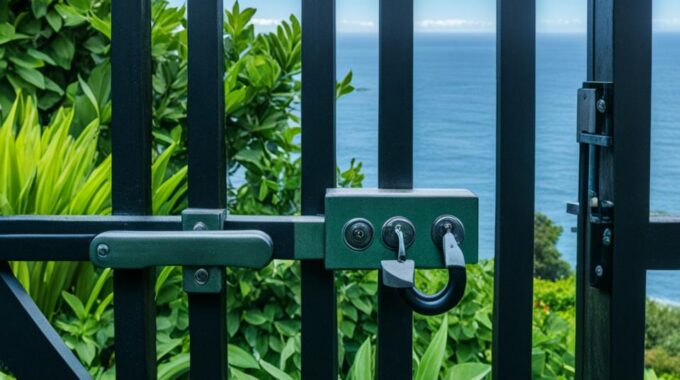
Protect Your Property in Costa Rica | Prevent Title Theft
Are you worried about keeping your property in Costa Rica safe from title theft? It’s crucial to safeguard your investment. This guide offers steps and advice to make your property legally strong against threats. By taking the right steps, you can protect your real estate in Costa Rica well.
Key Takeaways:
- Understand the common risks of property title theft in Costa Rica, including fraudulent title transfers, forged documents, and property scams.
- Engage an experienced attorney to guide you through the nuances of property ownership and title protection in Costa Rica.
- Secure title insurance to safeguard against potential title defects and exercise caution with powers of attorney.
- Implement comprehensive security measures, such as surveillance cameras and neighborhood watch programs, to deter and prevent property theft.
- Stay informed about evolving property laws and regulations in Costa Rica to ensure your rights and investments are protected.
Understanding the Risks of Property Title Theft
It’s important to know about the risks of property title theft in Costa Rica. By understanding these dangers, we can take steps to avoid them. Property fraud involves things like fake title transfers, forged documents and signatures, and scams. Knowing about these can protect our investments.
Fraudulent Title Transfers
In Costa Rica, an often seen form of property fraud is illegal title transfers. Sometimes, Notary Public officials or workers at the National Registry help fraudsters. They might forge documents and transfer ownership without the real owner knowing. Dealing with these fraudulent transfers can be expensive and tough legally.
Forged Signatures or Documents
Fraud can also happen through forged signatures or fake documents. Fraudsters might try to change ownership records or deeds. Being careful and checking all documents well can stop these frauds.
Property Scams and Dishonest Sellers
There are also property scams in Costa Rica’s real estate market. Some people might sell properties they don’t own or use tricks to mislead buyers. Learning about these scams and checking sellers can protect our investments.
Unlawful Encumbrances or Liens
Fraudsters might also put illegal claims on properties. This can make selling or using the property hard for the real owner. An in-depth search of the title and taking quick action can prevent these problems.
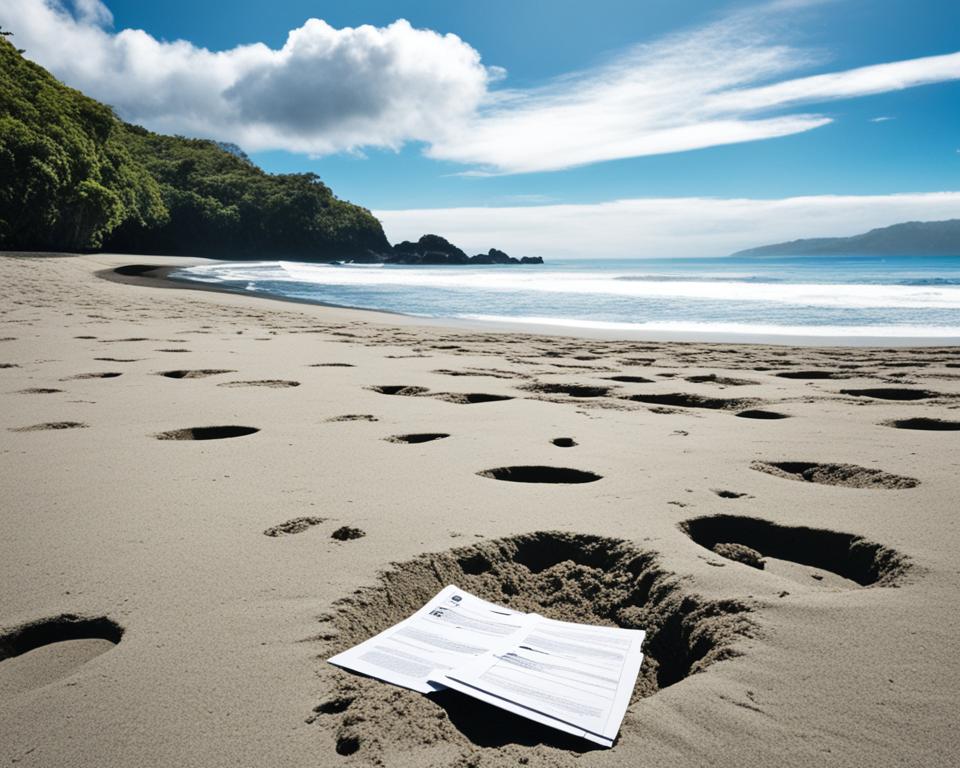
Knowing the risks of property title theft in Costa Rica helps us defend our investments. Staying alert, doing research, and getting expert advice are important. These steps can help reduce risks and keep our real estate safe.
Preventive Measures to Protect Your Property Title
To stop title theft in Costa Rica, take a few important steps. These steps will help keep your property safe and maintain the worth of your investment for the long haul.
Engage an Experienced Attorney
Hiring a real estate attorney who knows their stuff is key. They will search titles deeply, make sure the seller is who they say, and check that everything is done by the law. A good lawyer will guide you through all the legal bits of property buying and selling in Costa Rica.
Conduct a Thorough Title Search
A full title search is a must. It helps spot any issues linked to the property. This includes examining the property’s past, looking for any debts, and making sure the current owner really owns it. Doing a thorough search helps find and fix problems early on.
Verify Seller’s Identity and Authenticity
Checking the seller’s ID and the sale’s realness is very important. Always make sure all their documents match, and that they can legally sell the property. Keep your talks safe, and watch out for anything weird or out of place.
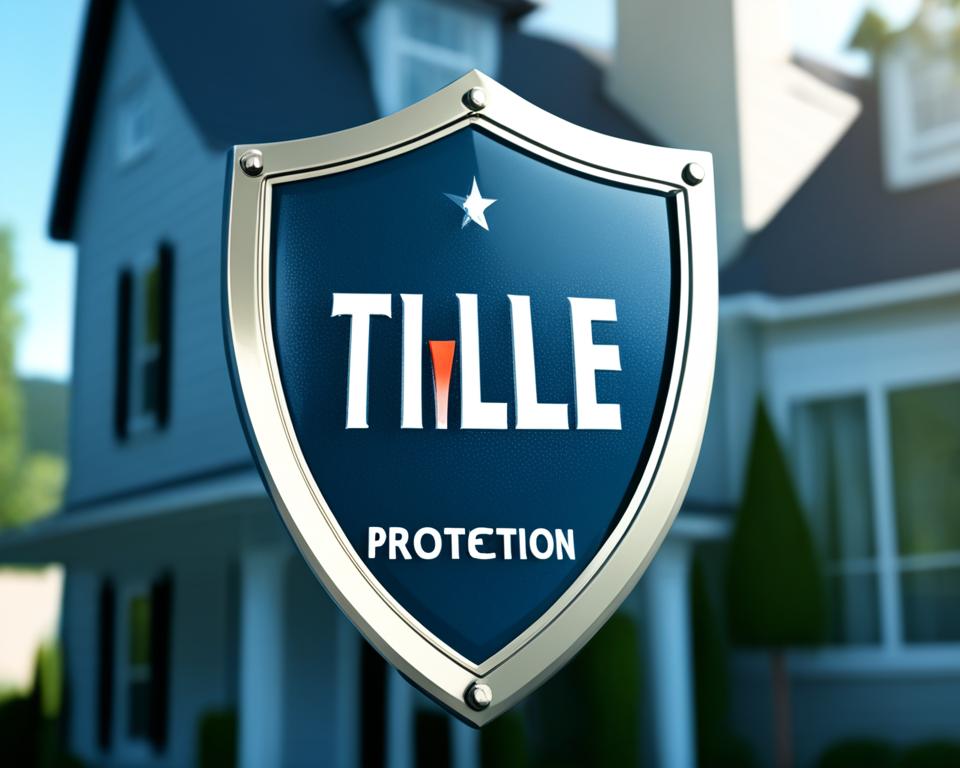
Following these steps can lower the chance of losing your property to theft. Getting help from a skilled attorney, searching titles deeply, and double checking the seller’s info are crucial in protecting your property rights.
Secure Title Insurance and Exercise Caution
Protecting your property title in Costa Rica goes beyond the steps we’ve talked about. It’s critical to get title insurance. Also, be careful with powers of attorney. These are key to keeping your real estate investments safe.
Secure Title Insurance
Costa Rica’s system for registering property is usually good. But, it’s wise to have title insurance for extra protection. This insurance helps if there’s a title problem. It pays for fixing these issues. That way, your ownership is safe, and your investment is too.
Exercise Caution with Powers of Attorney
When you give someone power of attorney in Costa Rica, be cautious. Make sure it’s clear and not too broad. This helps avoid it being used wrongly. Also, check that the people you give this power to are who they say. This reduces the chance of someone stealing your property or making deals without your knowledge.
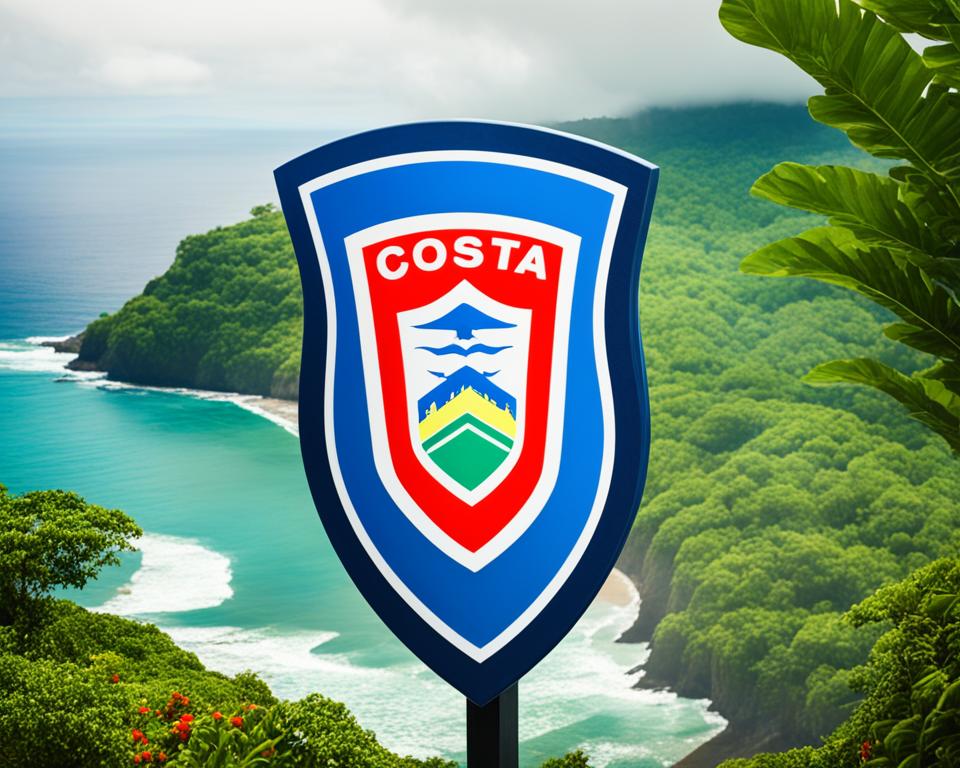
Protect Your Property in Costa Rica
There are key steps to safeguard your Costa Rican property. The first step is registering it correctly. Also, it’s vital to set up effective security systems. These actions can protect your investment and bring peace of mind.
Register Your Property Correctly
It’s crucial to have your property registered with the Costa Rican authorities. Check out the Costa Rican property laws. Then, follow the right steps to register your place. This way, you secure your property from would-be thieves.
Stay Informed of Property Law Changes
Laws about property ownership in Costa Rica can change. It’s important to stay informed. Keep up with any law updates that might affect your rights. If you’re unsure, legal and real estate experts can help keep you in the know.
Implement Security Measures
Security systems and measures are a must. They help keep your property safe. Think about using security cameras, alarms, and other devices. These steps can make your Costa Rican property more secure.
Participate in Neighborhood Watch Programs
Get involved with neighborhood watch groups. This adds another safeguard to your property. Working with neighbors to watch over the area is beneficial. It can reduce crime and boost security around your home.
Be Cautious with Personal Information
Guarding personal info is key for your property’s safety. Be careful about who you share property details with. Always be cautious with new people or groups. Protecting your data lowers the risk of fraud or property-related scams.
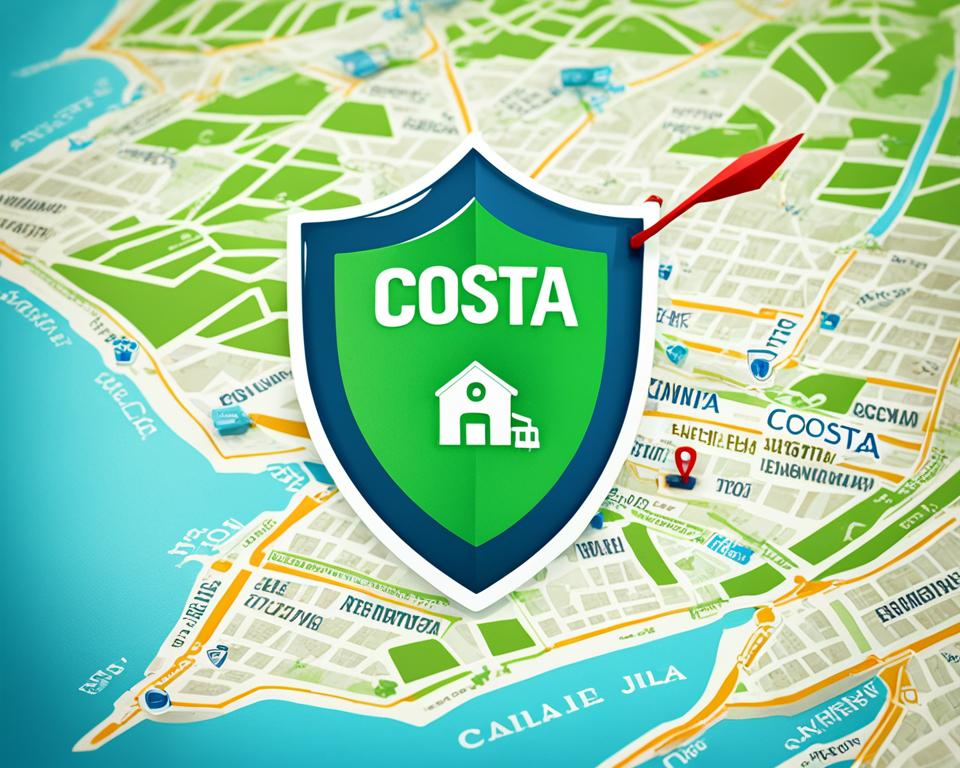
Safeguarding Your Investment
Protecting your property title in Costa Rica is crucial but can be complex. You need to be watchful, detailed, and get expert help. This means hiring a smart lawyer, checking titles carefully, getting title insurance, and keeping up with property law changes. Doing this cuts the chance of title theft and protects your investment for the future. Securing your property title means securing your peace of mind and keeping your real estate assets safe.
When you’re investing in Costa Rican real estate, focusing on property ownership security is key. By taking early steps to protect your investment and safeguard your property, you’ll feel more secure. This method helps against title theft and ensures your valuable assets stay yours. It’s the way to make sure you succeed as a property owner living abroad.
| Key Strategies for Safeguarding Your Investment | Benefits |
|---|---|
| Engage an experienced real estate attorney | Ensure legal compliance and minimize risks |
| Conduct thorough title searches | Verify property ownership and detect any issues |
| Secure title insurance | Protect against title defects and fraud |
| Stay informed of property law changes | Adapt your strategies to evolving regulations |
| Implement comprehensive security measures | Safeguard your property from theft and vandalism |
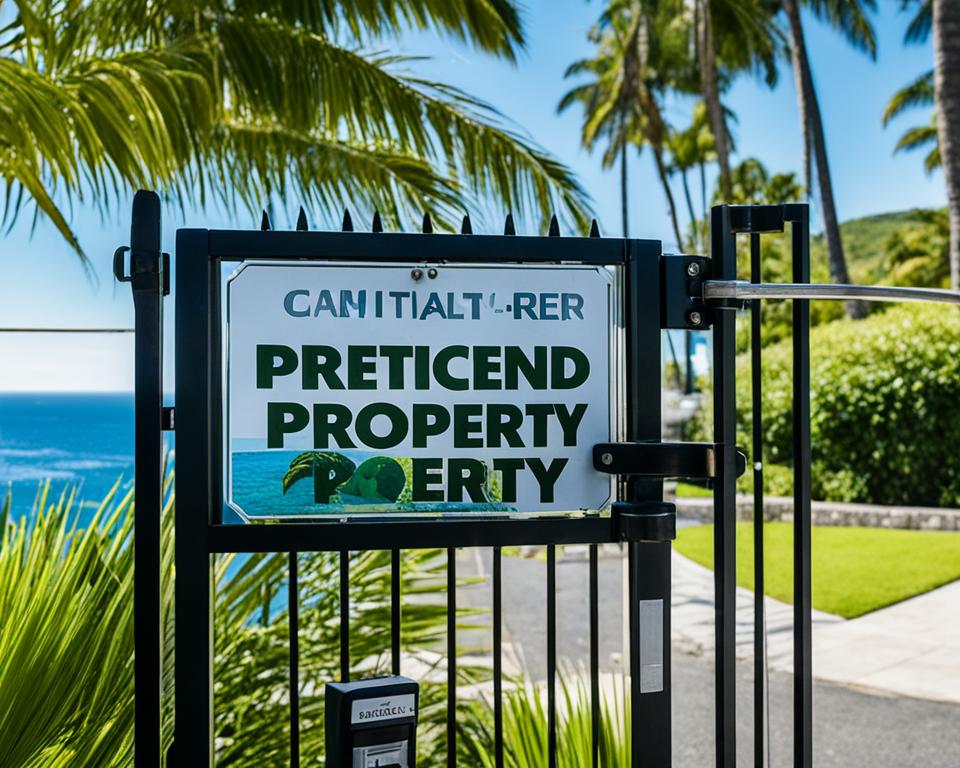
,
secure your real estate assets
, and
safeguard your property
from potential threats. This proactive approach will give you the peace of mind and confidence to enjoy the benefits of your
Costa Rican real estate investment
for years to come.
Conclusion
Protecting your property title in Costa Rica is ongoing work. It needs you to stay alert, be thorough, and get professional help. By following the tips in this guide, like working with a good lawyer and getting title insurance, you’ll lower the risk of title theft. That way, you can keep your investment safe and have peace of mind.
Living as an expatriate owner in Costa Rica means staying active in protecting your property rights. It’s crucial to keep up with local laws and rules. By preventing title theft and staying on top of security for property owners, you can fully enjoy your place in this stunning country.
Your property in Costa Rica is more than money – it’s a place of peace and a sign of your dedication. Making sure your title and property are secure is vital. It not only protects your investment. It also gives you a worry-free life and supports your expatriate property ownership for the future in this dynamic place.
FAQ
What are the common risks of property title theft in Costa Rica?
The risks of title theft in Costa Rica are many. They include fake transfers, forged documents, and scams by sellers. They also involve debts not revealed before buying.
What preventive measures can I take to protect my property title in Costa Rica?
To prevent title theft, work with a good lawyer. Also, do a deep check on the title. Make sure the seller is who they claim to be and that the deal is real.
How can title insurance help protect my property in Costa Rica?
Getting title insurance is a smart move. It shields you from hidden title problems. This way, your property investment is better protected.
What should I be cautious about when it comes to powers of attorney in Costa Rica?
Be very careful with powers of attorney. They might be used the wrong way, leading to theft or fraud of your property.
What other steps can I take to protect my property in Costa Rica?
Safeguard your property by following these additional steps. Register it properly and keep up with law changes. Add security to your property, join local watch programs, and guard your personal data tightly.
Source Links
- https://crie.cr/title-theft-in-costa-rica/
- https://livingcostarica.com/costa-rica-real-estate-topics/how-to-protect-your-costa-rica-property-rights/
- https://www.gapequityloans.com/en/protect-your-property/
- https://livingcostarica.com/costa-rica-real-estate-topics/what-is-the-solution-to-costa-rica-property-fraud?
- https://crie.cr/about-costa-rica-squatters-rights/
- https://www.gapequityloans.com/en/construction-loans/
- https://www.costaricaguide.co.cr/real-estate/buying-process/protecting-property-rights.html
- https://ticotimes.net/2021/02/21/what-to-know-about-setting-up-a-corporation-in-costa-rica-2-2
- https://www.gapequityloans.com/en/equity-loans-faq/
- https://www.gapequityloans.com/en/costa-rica-home-equity-loans-guide/
- https://costaricalaw.com/faqs/
- https://www.gapequityloans.com/en/costa-rica-home-equity-loans/
- https://gapinvestments.com/en/secure-loans-in-costa-rica/
- https://www.costarica.com/real-estate/protecting-your-investment
- https://bernardrealtycr.com/expert-guide-secure-property-investment-costa-rica/
- https://www.tropisphere.com/buying-owing-property-in-costa-rica/
Article by Glenn Tellier (Founder of CRIE and Grupo Gap)



